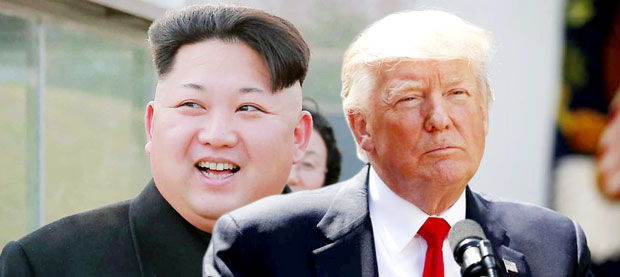Reply To:
Name - Reply Comment

 Like it or not we find that we’re having to get used to the paradoxes, contradictions and confusions of the Trump era.
Like it or not we find that we’re having to get used to the paradoxes, contradictions and confusions of the Trump era.
None is more apparent than his attack on the landmark Iran de-nuclearisation agreement, fashioned by the Obama Administration and the Iranian government. President Donald Trump wants to unwind it, even though it has the 100% support of the UN Security Council which in an unanimous vote enshrined the agreement in international law.
The Western politicians and pundits seem to have no historic memory- of when the US reneged or slowed down on the implementation of previous agreements
At the same time he is trying to lure the North Koreans into a de-nuclearization policy, at the least into a nuclear freeze to stop it developing its rocket science any further, so that it’s incapable of hitting the US with a nuclear-tipped missile. But, given Iran, why should the North Koreans go along with such a deal?
Why should it make such a deal when it knows there is a chance that the US might renege on this at a future date, as Trump wants to do with Iran?
The Western politicians and pundits seem to have no historic memory- of when the US reneged or slowed down on the implementation of previous agreements. President Bill Clinton fashioned a superb agreement, only to be left in the lurch by a Republican-dominated Congress that effectively undermined the deal by refusing to implement the commitment to end sanctions and to liberalize trade. If the Republicans hadn’t sabotaged that deal it is likely that North Korea would have no nuclear bombs today and would be happily warming itself on electricity from a safe light-water nuclear reactor that Clinton organized to be constructed- and now remains half built, a sad testimonial to what might have been.
If Trump wants a deal with the North he will have to shelve his onslaught on Iran. He will have to stop his demonizing of the country and his drive to get the Arab countries to arm more and stand up to it. He has just consummated a large arms deal with Saudi Arabia meant for this purpose.
If Trump wants a deal with the North he will have to shelve his onslaught on Iran. He will have to stop his demonizing of the country and his drive to get the Arab countries to arm more and stand up to it.
The Arab countries are in a mess. Egypt is under the hammer of a vicious dictator, Syria is ablaze, Iraq is on its back following the US/UK invasion, Saudi Arabia and the Persian Gulf states have provoked a serious crisis with Qatar and Saudi Arabia is killing thousands of innocents in Yemen. Only Jordan remains reasonably normal. Is the effort to demonize Iran an attempt to re-build a false unity among the broken-backed Arabs by backing Iran into a corner?
Ironically, in the time of President Jimmy Carter, an attempt was made to bolster the regime of the Shah, Mohammed Reza Pahlavi, to make sure Iran could militarily -- as a proxy of the US - dominate the Gulf. Indeed it helped it get going on its nuclear bomb research.
The Islamic revolution changed all that. The US felt beholden to the deposed Shah, giving him refuge in the US. Iran became a fundamentalist theocracy, a rallying place for those of a militant tendency, whether they be Shi’ite or Sunni. Their first item of business was to see the Shah returned to Iran for a trial that would have encompassed everything from corruption to the abuse of human rights. Instead of this the US and many of its European partners chose to go nose to nose, magnifying every disagreement.
Ironically, in the time of President Jimmy Carter, an attempt was made to bolster the regime of the Shah, Mohammed Reza Pahlavi, to make sure Iran could militarily -- as a proxy of the US - dominate the Gulf.
Then Saddam Hussein led Iraq into an eight-year war of attrition against Iran that was finally mediated to a standstill by the UN, leaving neither country a victor. The US under President Ronald Reagan had provided Iraq with arms and the fruits of its aerial reconnaissance. Most of the West turned a blind eye to Saddam’s use of chemical weapons- which Iran refused to use. The war, fought on Iranian territory, consumed tens of thousands of innocent lives.
One way of paying back was for Iran to fund fundamentalist militia, in particular Hezbollah, that would use its armed strength to try to undermine Israel, make Lebanon more militant and to aid the Palestinians. Later, other Iranian-backed militia entered war-torn Iraq and fought against the American occupiers. Iran itself fought against Al-Qaeda. Later still, its militia came to the aid of the Syrian dictator, Bashar al-Hassad.
All this Iranian activity is understandable although not agreeable. But this is what can happen when the US and its allies back a country into a corner.
The de-nuclearization deal could have been be a step to slowing Iran’s military forays, but Trump’s animosity is forestalling that possibility.
For the next three months the issue is can Trump learn from the history of American mistakes? For now he continues to deal destructively with Iran on the one side while he attempts to deal constructively with North Korea on the other, unaware of the contradiction.
How can he reassure North Korea that a deal they sign won’t be broken? That is the question.
Note: For 17 years the writer had been a foreign affairs columnist and commentator for the International Herald Tribune/New York Times.